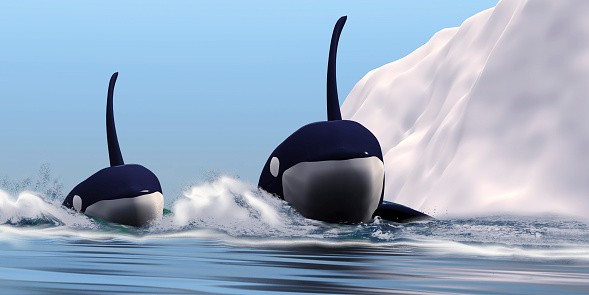An orca whale in Brazil was found dead with a plastic sheet in its stomach after being seen swimming and interacting with humans the day before. The whale was discovered on a beach in Espírito Santo and was 16 feet long. The conservation group Projeto Baleia Jubarte shared a video of the whale playfully interacting with people on a boat.
An oceanographer Paulo Rodrigues commented that it was unusual for the orca to act friendly towards humans, as they typically stay 330 feet from humans. Rodrigues believes that the whale's friendly behavior may have meant that it required help. The whale's body was later found thin and covered in shark bites on a beach in the municipality of Serra. The presence of barnacles on its body suggested that it had been unable to swim properly for an extended period.
Ingested and Tangled Plastic Debris
The International Union for the Conservation of Nature estimates that at least 14 million tons of plastic waste enter the ocean annually. This plastic can be ingested or tangled around marine animals' bodies, leading to injury or death. When ingested, the plastic can block an animal's digestive system, making it difficult to get enough nutrients and leading to malnutrition.
A necropsy conducted by Brazil's Orca Institute found a 2.5-foot-long sheet of hard plastic, plastic bags, and other debris in the orca's stomach. The institute's environmental manager, João Marcelo Ramos, stated that the stomach was empty except for this material, indicating that the whale had been unable to eat for an extended time.
The director of the Orca Institute, Lupércio Barbosa, noted that large amounts of plastic had been found in other marine animals in the area, which is a cause for concern among marine biologists. Orcas are known to swim in small groups along the Brazilian coast, and other instances of strandings have been recorded by the conservation group Projeto Baleia Jubarte during beach monitoring work. It is not mentioned whether these strandings were also due to plastic pollution.

Two orca whales pass near an iceberg in the northern Arctic Ocean. - stock illustration
ALSO READ: Marine Pollution Causes Sea Turtles to Die After Accidentally Eating Tons of Plastic Trashes
Affecting Marine Life
According to the IUCN report, approximately 300 million tons of plastic are produced annually for various purposes. However, at least 14 million tons of this plastic end up in the ocean annually, making up 80% of all marine debris in surface waters and deep-sea sediments. This plastic pollution threatens marine species, as they may ingest or become entangled in the debris, leading to injury or death. Plastic pollution also risks food safety and quality, human health, and coastal tourism and contributes to climate change. Implementing new and existing legally binding agreements is important to address this issue.
Plastic debris is the most common litter found in the ocean, making up 80% of all marine debris. It can be found on the shores of every continent, with higher concentrations in areas with more tourists or higher populations. Plastic pollution in the ocean largely comes from land-based sources such as urban and stormwater runoff, sewer overflows, littering, poor waste management, industrial activities, tire wear, construction, and illegal dumping. Plastic pollution can also come from ocean-based sources such as fishing, shipping, and aquaculture.
When exposed to solar UV radiation, wind, currents, and other natural factors, plastic breaks down into smaller particles called microplastics (smaller than 5 mm) or nano plastics (smaller than 100 nm). These small particles are easy for marine life to ingest accidentally. Many countries do not have the necessary infrastructure to prevent plastic pollution, such as proper waste disposal facilities and recycling systems. This leads to plastic entering rivers and the ocean. The global trade of plastic waste, both legal and illegal, can also harm ecosystems in areas without sufficient waste management systems.
RELATED ARTICLE: 16-Kilogram Plastic Waste Found Inside Dead Whale's Stomach; Environmentalists Express 'Anger' Over Discovery
Check out more news and information on Plastic Waste in Science Times.














